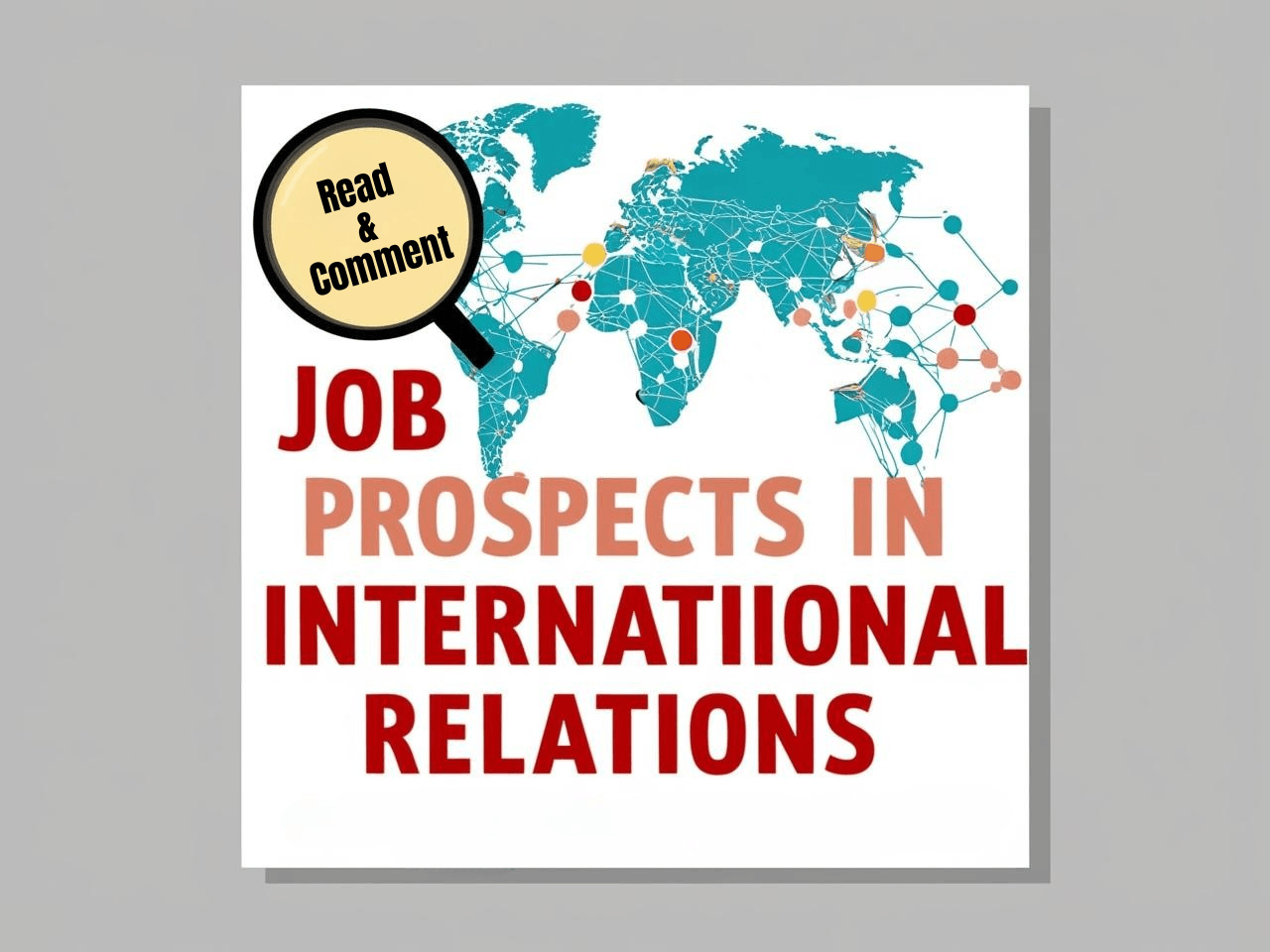
Yesterday, I entered a class and spent some quality time with the students present there. We were chatting and discussing various topics. All were going with the flow and then our chatting headed towards careers. I happened to ask them what they plan to do in future. I was amazed by the different responses I got. Some said Diplomacy and Foreign Service, some wanted to work for International Organisations. Some even answered their liking towards Government and Public Service, Non-Profit and Non-Government Organisations. Then there were enthusiasts who wished to work as International Business and Trade professionals. Some even showed their inclination towards Journalism and Media and some even wanted to go for Research.
I was amazed at the diversity of career options in one single class. So, I asked them what is the common thread. What this class is on. Then came the answer “International Relations”
I am sure you would be interested in knowing more about it as some of you might be studying the subject.
Hello all, I am Kapeel Gupta, founder of study abroad academy. I am on a mission to coach and mentor 100,000 high school students and help them realize their dream of studying in the best universities of the world and build happy and successful careers for themselves.

Today the topic is “International relations” and it is a versatile degree that provides career opportunities in law, trade, diplomacy, security, marketing, and much more. Students will study disciplines like political science, history, anthropology, sociology, and economics. If you’re interested in traveling, working, and living abroad, international relations is a good degree.
International relations is the study of the relationships between countries. That includes a huge range of subjects such as foreign policy, trade, diplomacy, and war. International relations also study the many actors involved such as governments, intergovernmental organizations, corporations, and NGOs. Because the term (which is also called “international affairs”) is so broad, it includes disciplines as diverse as economics, sociology, religious studies, and more.
What do you study during an international relations degree program?
When you study for an international relations degree as an undergrad, you’ll take classes from a wide range of disciplines. You take classes in international relations, political science, economics, anthropology, history, comparative literature, sociology, and more. All programs are a mix of required courses (usually on the theory and practice of international relations) and a range of electives. International relations students also need to study languages and may be required to spend a year abroad.
After graduation, many students continue their education and get a master’s degree in international relations. This opens up your job opportunities and eligibility for higher-level jobs. Most programs take around two years, although you may be able to finish earlier or take courses part-time while you work. Master’s programs don’t look too different from undergrad. You’ll also need to choose a specialization in a field like law, security, trade, business, and so on. Language proficiency is an important piece of a master’s degree; you’ll likely need to know at least one of the six official UN languages (French, English, Spanish, Arabic, Chinese, and Russian). During the first year, many programs focus on courses. The second year is often dedicated to the dissertation.
As you complete an international relations degree, you’ll learn about a range of topics, but what skills are you gaining? Many of the skills are transferable, which is another reason why an international relations degree is a good choice. Here are three of the most useful:
Critical thinking
Because international relations programs deal with different theories, lots of information, multiple disciplines, and big questions about peace, war, diplomacy, and so on, students must sharpen their critical thinking skills to be successful. Even if you don’t go on to a career specifically in international relations, critical thinking skills are desirable in every career.

Good research skills
International relations degree programs involve a lot of research. It’s more than just looking at lots of information, however; the field works with many types of research methods. As a student, you’ll learn what these methods are, where they’re best applied, and their strengths and weaknesses. You’ll also learn how to identify good sources from books, academic journals, databases, government websites, and much more.
Many jobs require (or at least benefit from) the skills associated with good research, such as goal-setting, data analysis, attention to detail, time management, and clear communication.
Good cross-cultural communication
“Culture is often talked about in contexts of geography, ethnicity, and religion. When people come from different cultures, it can cause misunderstandings and conflict. When communication is improved, diversity has significant benefits. Cross-cultural communication is a bedrock of international relations.
More and more organizations today want job candidates with cultural awareness and sensitivity, adaptability, patience, and a commitment to creating supportive, inclusive environments.
There can be multiple career paths for following this field.
Class 11 & 12 though can be done through any stream but preferable is Humanities. Then you follow it up with Bachelors in Political Science. Finally you can do Masters in Political Science or International Relations. One can also do Post Graduate Diploma in International Relations
There are several career categories you can explore with an international relations degree. How much you earn depends on factors like how much education you have, how much experience, what the job entails, who employs you, and where the job is located. To give you a clearer idea of what your career could look like, here are seven job descriptions and their average salaries as per the US Job Market:
Political consultant National average salary (USA): $35,023
International policy analyst National average salary (USA): $76,994
Diplomatic agent or Foreign Service Officers National average salary (USA): $97,444/year
International marketing manager National average salary (USA): $99,600
International banking officer National average salary (USA): $70,677
Language specialist National average salary (USA): $51,682
International lawyer National average salary: $85,153
This information is just to guide you on different careers. But I will still insist on choosing a career in consultation with a career consultant. If you can’t find one, connect with me. I shall help you out. Please stay away from your uncles, aunts and neighbours for this decision. They look good in family functions only not while choosing a career.
I hope you find this blog useful. I would request all of you to please write comment and give feedback. This also helps in our learnings and we get to prepare content that is most required by our readers.
If you would like to listen to the blog/podcast on 'The Kapeel Gupta Career PodShow' , then click Here
Book Your FREE Face-2-Face Consultation Session
Click HERE
Created with © systeme.io





